Gut-Healthy Fats: Embracing the Goodness of Healthy Fatty Foods
Introduction:
When it comes to gut health, fats play a crucial role. In this blog, we will explore the world of gut-healthy fats and uncover the benefits of incorporating them into your diet. Get ready to embrace the goodness of healthy fatty foods for optimal gut health.
The Wonders of Omega-3 Fatty Acids

Omega-3 fatty acids are essential fats that play a crucial role in maintaining gut health.
Here’s why omega-3s are important:
Reducing Inflammation: Omega-3s have anti-inflammatory properties that help reduce inflammation in the gut. Chronic inflammation in the gut can contribute to various digestive disorders, such as inflammatory bowel disease (IBD) and irritable bowel syndrome (IBS). By including omega-3-rich foods in your diet, you can help support a healthy gut environment.
Balancing Gut Microbiome: Omega-3s have been shown to promote a balanced and diverse gut microbiome. They can help increase the levels of beneficial bacteria while reducing the growth of harmful bacteria. A healthy gut microbiome is essential for proper digestion, nutrient absorption, and overall gut health.
Omega-3-rich foods include:
Fatty fish: Salmon, mackerel, sardines, and trout are excellent sources of omega-3 fatty acids. Aim to include these fish in your diet at least twice a week.
Chia seeds: These tiny seeds are packed with omega-3s, fiber, and other nutrients. Add them to smoothies, or yogurt, or sprinkle them on top of salads or oatmeal.
Flaxseeds: Ground flaxseeds are a great plant-based source of omega-3s. Add them to baked goods, oatmeal, or smoothies for an omega-3 boost.
Incorporating omega-3-rich foods into your diet can have numerous benefits for gut health. However, if you have specific health conditions or concerns, it’s always a good idea to consult with a healthcare professional or a registered dietitian for personalized advice and guidance.
The Power of Avocados
Avocados are not only delicious but also offer several nutritional benefits for gut health. Here’s why avocados are good for your gut:
Healthy Fats: Avocados are rich in monounsaturated fats, which are heart-healthy fats that can help reduce inflammation in the body. These fats also aid in nutrient absorption, including fat-soluble vitamins like vitamin E and vitamin K, which are essential for gut health.
Fiber: Avocados are an excellent source of dietary fiber, which is essential for a healthy digestive system. Fiber promotes regular bowel movements, prevents constipation, and helps maintain a healthy weight. It also acts as a prebiotic, providing fuel for the beneficial bacteria in your gut, thus supporting a diverse gut microbiome.
Essential Nutrients: Avocados are packed with essential nutrients such as potassium, magnesium, and vitamins C, E, and B6. These nutrients support various aspects of gut health, including proper muscle function, immune system function, and antioxidant protection.
Satiety and Digestion: The combination of healthy fats and fiber in avocados can help promote feelings of fullness and satisfaction after a meal. This can contribute to better portion control and reduced overeating, supporting healthy digestion and weight management.
Incorporating avocados into your diet is simple. You can enjoy them sliced on toast, added to salads, blended into smoothies, or as a creamy addition to various dishes. Remember to include them as part of a well-balanced diet that includes a variety of fruits, vegetables, whole grains, and lean proteins for optimal gut health.
Coconut: A Versatile Gut-Healthy Fat
Coconut is a versatile tropical fruit that offers unique properties and numerous benefits for gut health. Here’s why coconut is a great addition to your diet:
Coconut Oil: Coconut oil contains medium-chain triglycerides (MCTs), which are easily digested and provide a quick source of energy for your body. MCTs have antimicrobial properties that can help combat harmful bacteria and promote a healthy gut microbiome. You can use coconut oil for cooking, baking, or as a healthy addition to your smoothies.
Coconut Milk: Coconut milk is a rich and creamy dairy alternative that is lactose-free and suitable for those with lactose intolerance or dairy allergies. It contains healthy fats and provides a good source of dietary fiber, which supports digestive health and promotes a feeling of fullness. Coconut milk can be used in curries, soups, smoothies, or enjoyed on its own.
Coconut Meat: Coconut meat is the white, fleshy part of the coconut that is packed with fiber and essential nutrients. It contains both soluble and insoluble fiber, which can aid in digestion, promote bowel regularity, and support a healthy gut environment. You can enjoy coconut meat fresh, dried, or incorporated into recipes such as salads, desserts, and energy balls.
Incorporating coconut into your diet is easy and delicious. You can add coconut oil to your cooking, use coconut milk in your recipes, or enjoy fresh coconut meat as a snack. Just remember to consume coconut in moderation as part of a well-balanced diet.
Nuts and Seeds for Gut Health
Nuts and seeds are nutritional powerhouses that offer a wide range of health benefits. Let’s explore the nutritional value of some popular varieties:
Almonds: Almonds are rich in healthy fats, protein, fiber, vitamin E, and magnesium. They provide a satisfying crunch and make a great addition to salads, oatmeal, or homemade granola. Snack on a handful of almonds for a nutrient-packed boost during the day.
Walnuts: Walnuts are a good source of omega-3 fatty acids, which are essential for brain health and reducing inflammation. They also contain antioxidants and fiber. Sprinkle walnuts on top of yogurt, add them to baked goods, or enjoy them as a snack to reap their nutritional benefits.
Pumpkin Seeds: Pumpkin seeds are packed with nutrients like magnesium, zinc, iron, and antioxidants. They also provide a good amount of fiber and healthy fats. Add pumpkin seeds to smoothies, sprinkle them on salads, or use them as a crunchy topping for roasted vegetables.
Incorporating nuts and seeds into your diet is simple and versatile. You can enjoy them on their own as a snack, include them in trail mixes, or use them as ingredients in recipes like energy balls or homemade nut butter. Just be mindful of portion sizes as nuts and seeds are calorie-dense.
Conclusion: Healthy fats are essential for gut health, and incorporating gut-healthy fats into your diet can bring numerous benefits. By including omega-3-rich foods, avocados, coconut, nuts, and seeds in your meals, you can support optimal digestion, nourish your gut lining, and promote a balanced gut microbiome. Embrace the goodness of healthy fatty foods for a thriving gut.

